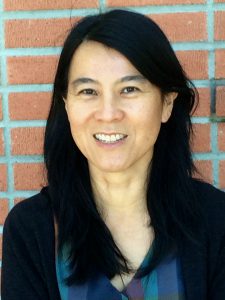Faculty and Staff
David Shafer, Ph.D.
Professor
Chair, Department of History
Location: FO2-102
Email: david.shafer@csulb.edu
Full-Time Faculty

Emily Berquist, Ph.D.
Professor
Emily Berquist Soule, Ph.D. is a Professor of History who specializes in the Spanish Atlantic world, the early modern Spanish empire, and colonial Latin America. She is at work on her second monograph, The Atlantic Slave Trade and the Rise and Fall of the Spanish Empire (under contract, Yale University Press), a 500-year history of the slave trade to the Spanish Atlantic empire, from Castile's first overseas ventures to the Canary Islands in the mid-fourteenth century to the final abolition of slavery in Cuba (1886). Her first book, The Bishop's Utopia: Envisioning Improvement in Colonial Peru was published by the University of Pennsylvania in 2014. At Long Beach, Dr. Berquist teaches upper-division courses that focus on slavery, religion, and visual culture in colonial Latin America and the early modern Spanish empire. Dr. Berquist is also editor of the journal Atlantic Studies: Global Currents, where she handles submissions on the Global South.
Courses HIST 362: Colonial Latin America; HIST 460/560: Slavery in Latin America; HIST 465: Seeing Latin America: Visual Culture and History in the Latin American World; HIST 499: 466: Gods, Saints, and Sinners: The Culture of Religion in Colonial Latin America; 499: Senior Seminar (How to Stage a Revolution-Latin American History
Email: emily.berquist@csulb.edu
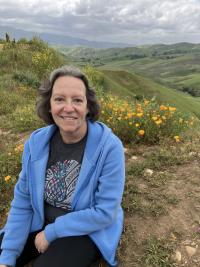
Donna Binkiewicz, Ph.D.
Full-Time Lecturer
Donna Binkiewicz began her academic career with an A.S. degree from Maui College, then earned her B.A. in History at UC Berkeley (Go Bears!). She completed her M.A. and Ph.D. in United States History at UCLA (Go Bruins!). Her research is focused on recent American politics and culture as well as immigration history. In 2021, she published her second book, Between the Sea and Sky: My Portuguese American Family in Upcountry Maui, 1881-1941, which explores (through family history) the immigration of Portuguese workers to Hawaii and their endeavors to honor their cultural traditions while also building new lives in rural Hawaii. Her first monograph, Federalizing the Muse: United States Arts Policy and the National Endowment for the Arts, 1965-1980, was published in 2004. It analyzes the relationship of American Cold War politics and American visual arts in the founding and administration of the NEA’s visual arts program, including its emphasis on modernist art. Dr. Binkiewicz also serves on the Editorial Board of The History Teacher journal. She teaches a variety of American history courses.
Courses HIST 173: Recent United States; HIST 172: Early United States; HIST 301: Methodology of History; HIST 378: US 1877-1920; HIST 379: US 1920-1945; HIST 380A: US 1945-1968; HIST 451: US in the World; HIST 475: US Immigration and Ethnicity; HIST 473: California History; HIST: 499: US Politics and Policy
Location: FO2-107
Email: Donna.Binkiewicz@csulb.edu
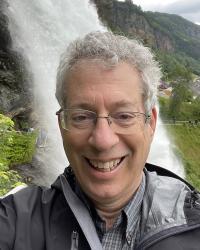
Jeffrey Blutinger, Ph.D.
Professor
Director, Jewish Studies
Jeffrey C. Blutinger received his B.A. in English Literature (1984), his J.D. (1988), and his M.A. and Ph.D. in History (1997, 2003) all from UCLA (go Bruins!). His research interests include modern Jewish history, historiography, Holocaust, memory and memorialization, and contemporary antisemitic extremism. He has taught in the History Department since Fall 2004, where he has also served first as Assistant Director, and then as Director of the CSULB Jewish Studies Program. He also in the inaugural holder of the Barbara and Ray Alpert Endowed Chair in Jewish Studies.
He currently has a book manuscript, Heinrich Graetz: Writing History With Tears and Fire, undergoing peer review. It is an intellectual biography of one of the most influential Jewish historians of the nineteenth century. Other recent scholarship includes “A New Protocols: Kevin MacDonald’s Reconceptualization of Antisemitic Conspiracy Theory,” Antisemitism Studies. 5:1 (2021); “‘I Know One Day a Miracle Will Happen’: Bruno Balz and the Position of the Gay Artist in Nazi Germany,” Journal of the History of Sexuality, 30:3 (2021); and “Classroom Revolutionaries: A Case Study of Radical Left-Wing Antisemitism in the California State University System,” (accepted). He also regularly leads a short-term study-abroad course on the Holocaust.
Courses HEBW 100/HIST 140: Jewish Humor; HIST 141: Introduction to Jewish Civilization; HIST 301: Methodology of History; HIST 304: History of the Holocaust; HIST 344: Modern European Jewish History; HIST 345: Comparative Genocide; HIST 393: Jews of the Modern Middle East; HIST 420: Modern Israel; HIST 499: Senior Seminar.
Location: FO2-210
Email: Jeffrey.Blutinger@csulb.edu
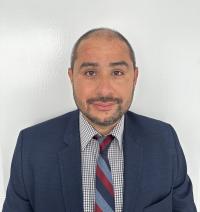
Isacar Bolaños, Ph.D.
Assistant Professor
Isacar Bolaños specializes in the environmental history of the Ottoman Empire. He received his BA in History from University of California, San Diego in 2008, MA in Near Eastern Studies from University of Arizona in 2011, and PhD in History from Ohio State University in 2019. His publications have appeared or will appear in major flagship journals such as the International Journal of Middle East Studies, Environmental History, and the Bulletin of the History of Medicine. In 2022-2023, he was awarded a fellowship from the American Council of Learned Societies to work on a book that examines the history of natural disasters in Ottoman Iraq during the nineteenth and early twentieth centuries. He has also started working on several other research projects, including a history of crop exchanges between the Ottoman Empire and the Americas, the history of environmentalism in the Middle East, and a global history of the Great Depression. At CSULB, he offers courses on topics related to world history, environmental history, the history of medicine, and the modern Middle East; he also regularly teaches in the History Department’s core curriculum.
Courses HIST 396: Contemporary World History; HIST 397: Global Environmental History; HIST 398: Global Histories of Health, Medicine, and Disease; HIST 432: Change and Continuity in the Modern Middle East; HIST 301: Methodology of History; HIST 499: Senior Seminar
Location: FO2-111
Email: isacar.bolanos@csulb.edu
Daniele Bolelli
Lecturer
Daniele Bolelli's research interests include American Indian history, the history of world religions (with a particular focus on Taoism and Buddhism, and on the interaction between monotheistic and polytheistic religions), U.S. History (in particular, American popular culture), the history of ancient Rome, and the global history of martial arts.” Professor Bolelli hosts the popular podcast History on Fire.
Location: FO3-306
Email: bodhi1974@yahoo.com
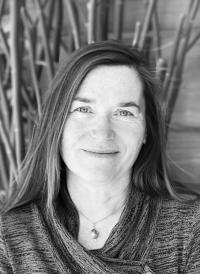
Patricia Cleary, Ph.D.
Professor
Patricia Cleary joined CSULB after completing her Ph.D. in U.S. History at Northwestern University. She teaches courses in early American history, women’s history, Indigenous histories, and the history of food. Her research interests have evolved over time. Her work on the intersections of gender and commerce featured in her first book, Elizabeth Murray: A Woman’s Pursuit of Independence in Eighteenth-Century America (University of Massachusetts Press, 2000) and on the NEH-funded website: The Elizabeth Murray Project: A Resource Site in Early American History. She explored the social, economic, and political dynamics of a French-speaking outpost of the Spanish empire in The World, the Flesh, and the Devil: A History of Colonial St. Louis (University of Missouri Press, 2011). In turn, that project led her to an examination of the life, death, and afterlife of the Indigenous mounds and settlement that pre-dated the founding of the modern city, focusing not only on recovering the histories of the mounds and the Indigenous peoples of the area but on documenting the processes involved in the appropriation of their monuments and their histories. These themes featured in Mound City: The Place of the Indigenous Past and Present in St. Louis (University of Missouri Press, 2024).
Courses HIST 301: Methodology; HIST 349: History of Food; HIST 372: Early America; HIST 373: American Revolution; HIST 485A: Early US Women; HIST 499: Senior Seminar (Indigenous Histories); HIST 510F: Literature of US History
Location: FO2-212
Email: patricia.cleary@csulb.edu
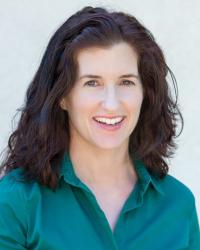
Jane Dabel, Ph.D.
Professor
Jane E. Dabel, Ph.D., is a Professor of History at California State University, Long Beach. Her research explores the public lives of African American women in 19th-century New York, focusing on themes of respectability, economic agency, and interracial relationships. Her acclaimed book, A Respectable Woman: The Public Roles of African American Women in 19th-Century New York (NYU Press, 2008), examines how Black women navigated and influenced public and social spheres.
Professor Dabel was honored with the Distinguished Faculty Teaching Award in 2007. Beyond the classroom, she serves as the editor of The History Teacher, the leading journal in the United States dedicated to advancing history education. Under her leadership, this award-winning publication continues to shape the field by providing innovative pedagogical strategies and scholarly discourse on teaching history effectively.
At CSULB, Professor Dabel teaches upper-division courses on Civil War and Reconstruction, African American history, historical research methods, and social movements in U.S. history. Her work has been featured in leading peer-reviewed journals, making significant contributions to African American history, gender studies, and urban history.
Courses HIST 376: Civil War and Reconstruction; HIST 486: Afro-Americans in the United States; HIST 301: Methodology of History; HIST 172: Early United States History; HIST 499: Senior Seminar (Riots, Strikes, and Conspiracies)
Location: FO2-202
Email: Jane.Dabel@csulb.edu
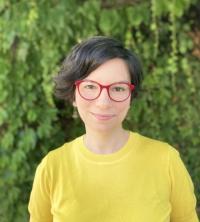
Kate L. Flach, Ph.D.
Assistant Professor
Kate L. Flach received her B.A. in Education and M.A. in History from the University of Akron, and a Ph.D. in History from UC San Diego. Her research interests include modern US history, media history, race, gender, social movements, and the history of education. She is currently completing her book manuscript tentatively titled, Producing America: Race, Media, and National Identity, which examines how Americans have envisioned television as a site for civic engagement and liberal politics in the 1960s-1970s. Her article “‘America’s Nervous Breakdown’: Mary Hartman, Mary Hartman, Popular Psychology, and the Demise of the Housewife in the 1970s,” explores the role television played in upending the cold war consensus that contributed to the anxieties of everyday people and rise of popular psychology. Her bylines have appeared in The Washington Post and are available on Bunk History.
Courses HIST 173: Recent US History; HIST 301: Methodology of History; HIST 499: Senior Seminar (The Politics of Education); HIST 485B: History of Women in the US since 1850; HIST 476: The History of Social Activism; HIST/AMST 453: Television Borders: Cultural Crossings in the US Southwest and South
Location: FO2-105-A
Email: kate.flach@csulb.edu
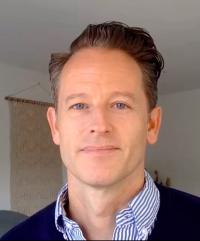
Andrew Fogleman, Ph.D.
Lecturer
Andrew Fogleman received his Ph.D. in History from USC and teaches courses on medieval history. His research focuses on the intersection of medicine, science, and religion in Europe during the Late Medieval and Early Modern periods. His most recent article (2022), "Holy Instruction, Demonic Deceit, and the Body: A Translation of Jean Gerson's Sermon on Angels (Collatio de angelis)," explores the physiology of religious visions and demonic deception, highlighting the delicate role that cognition plays in assessing medieval supernatural experiences.
Courses HIST 316: Early Medieval History; HIST 317: High Middle Ages: HIST 319: Women in Ancient and Medieval West; HIST 351: Medieval England; HIST 499: Science and the Supernatural in the Middle Ages; HIST 333: Reformation Europe; HIST 301: Methodologies of History; HIST 302: History and Theory; HIST 101: Facts, Evidence, and Explanation; HIST 111: World History; and CLA 390 Series: Career Readiness for Liberal Arts Students
Location: FO2-109
Email: Andrew.Fogleman@csulb.edu
Gail Hamilton
Lecturer
Advisor, History/Social Science Single Subject Credential Program
Location: FO2-117
Email: gail.hamilton@csulb.edu

Ali F. Iğmen, Ph.D.
Professor
Director, Oral History Program
Director, Research in the Humanities, College of Liberal Arts
Ali İğmen is Professor of Central Asian History, the Director of Research in the Humanities, and the Director of the Oral History Program, and past President of Central Eurasian Studies Society (2018-19). His most recent publications are, Tulips in Bloom, An Anthology of Central Asian Literature, co-edited with Gabriel McGuire, Naomi Caffee, Emily Laskin, Samuel Hodgkin and Christopher Fort (2024), and Making Culture in (Post) Socialist Central Asia, co-edited with Ananda Breed an Eva-Marie Dubuisson. London: Palgrave Pivot, (2020,) and “Soviet Central Asia” in Central Asia: Context for Understanding. David W. Montgomery, ed. (2022.)
He works on the history of Soviet culture and gender politics in Central Eurasia and Turkey, currently writing his third book to the Becoming a Citizen During the Multi-Party Era in Republican Turkey: A Female Journalist’s Journey in the city of Bursa, from 1958 present. He received his doctorate from the University of Washington in Seattle, and taught at the University of Wisconsin in Madison, Kyrgyz National University in Bishkek, Osh State University in Osh, Kyrgyzstan, and Boğaziçi University in Istanbul, Turkey. He received a NEH Grant with Indiana University in 2025 to conduct oral history interviews with Central Asians about the dissolution of the USSR.
Courses HIST 302: Theory and History; HIST 402: Oral History Methods; HIST 395: Gender, Sexuality, and Desire in World History; HIST 418/518: Central Asia and Afghanistan; HIST 440/540: Silk Roads; HIST 499: Twentieth-Century Popular Culture and Sport; HIST 590: Comparative Empires, HIST 641: Urban History
Location: FO2-116
Email: ali.igmen@csulb.edu
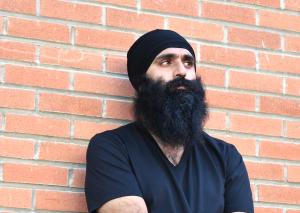
Rajbir Singh Judge, Ph.D.
Assistant Professor
Rajbir Singh Judge is Assistant Professor of History and Associate Member of Asian and Asian American Studies at California State University, Long Beach. He specializes in the intellectual and cultural history of South Asia with a particular emphasis on Punjab and the Sikh tradition. His first book, Prophetic Maharaja: Loss, Sovereignty, and the Sikh Tradition in Colonial South Asia was published by Columbia University Press in 2024. He is currently working on his second book, A Critique of Contextual Reason, for which he was awarded membership at the Institute for Advanced Study in the 2024-2025 Academic Year. His publications have appeared in the Journal of the American Academy of Religion, Critical Times: Interventions in Global Critical Theory, Comparative Studies of South Asia, Africa, the Middle East, Modern Asian Studies, Theory & Event, Cultural Critique, the Journal of the History of Sexuality, History & Theory, among others.
More about Dr. Rajbir Singh Judge
Courses HIST 302: Theory & History; HIST 385: Histories of South Asia; HIST 396: Contemporary World History; HIST 436: Challenging Empire: The Ordeals of Decolonization; HIST 438: History of Marxist Thought; HIST 439: Global Freud: Psychoanalysis and the Clinic in World History; HIST 450/550: Foucault and His Critics; HIST 499: Senior Seminar (Commodities); HIST 510E: Literature of World History; HIST 641: Seminar in World History.
Location: FO2-113
Email: rajbir.judge@csulb.edu
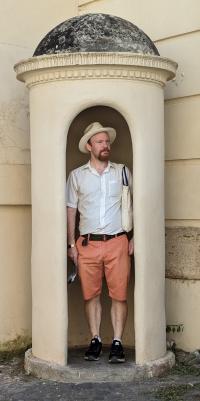
Mik Larsen, Ph.D.
Lecturer
Dr. Mik Larsen is a scholar of the Roman Empire and the ancient Mediterranean who has taught at CSULB since 2018, most recently as the Interim David Hood Chair in Ancient History, after graduating with his PhD from UCLA in 2015. His areas of research and study include ancient rhetoric, social mobility, religion, epigraphy, and ancient historiography. He teaches courses on Greece and Rome in antiquity as well as on theory in history and special topics in the social and cultural history of the ancient world; he also heads the Ancient/Medieval field for the MA program here at CSULB. He’s currently working on a manuscript about the rhetoric of poverty in the late Roman Republic and early Empire.
Courses HIST 313: Ancient Greece; HIST/CLSC 310: The Greek World; HIST 314: Ancient Rome; HIST/CSLC 312: The Roman World; HIST 315: Egypt, Sumer, and the Ancient Near East; HIST 413: Religion in the Ancient Mediterranean; HIST 302: History and Theory; HIST 499: Senior Seminar; HIST 510: Introduction to Ancient Historiography; HIST 611: Graduate Research Seminar
Location: FO2-108
Email: mik.larsen@csulb.edu
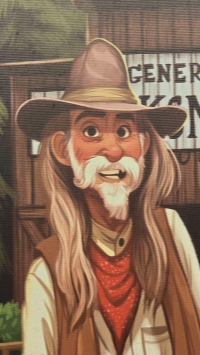
Jeffrey Lawler
Lecturer
Director, Center for the History of Video Games, Technology and Critical Play
Jeffrey Lawler began teaching at CSULB in 2001. Since 2017 he has been Co-Director of the CSULB Center for the history of video games, technology, and critical play. - a playable archive and research center for students and the community.
Current projects focus on the relationship between leisure spaces and race, specifically the way that white suburban communities employed normative ideas of safety that reinforced segregation in Southern California. His most recent publication “Lacking for Leisure: Spatial Constraints in Non-White Communities in Los Angeles,” in Interdisciplinary Digital Engagement in Arts & Humanities (IDEAH), explores perceptions and placement of arcades in South Central Los Angeles. Other work examines the depictions of historical spaces in video games, “The Historical Environment as Aged Icon in the Gamed West” in Comparative American Studies An International Journal. His most recent publication with Sean Smith “Imagining the Other: Historical Possibilities and Teaching in Twine” (Entwine: A Critical and Creative Companion to Teaching with Twine), Amherst College Press, analyzes the usefulness of game creation as a pedagogical tool.
Courses History 173: Modern U.S. History; 305: HIST Digital Methods; HIST 306: Playing the Past; HIST 307: Cultural History of Technology; HIST 471:The American West; HIST 473: California History
Location: FO2-218
Email: jeffrey.lawler@csulb.edu
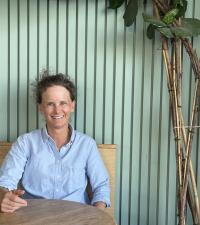
Eileen Luhr, Ph.D.
Professor
Originally from Buffalo, Dr. Luhr has taught US cultural history and history pedagogy at CSULB since 2006. She also coordinates the History-Social Science credential program and serves as president of the Society for History Education, which publishes The History Teacher.
Dr. Luhr’s research illuminates the intersection of religion, politics, and consumer culture. Her first book, Witnessing Suburbia: Conservatives and Christian Youth Culture (UC Press, 2009), examines changes to evangelicalism amid Sunbelt migrations, the rise of conservatism, and the expansion of consumer culture. Her second book, Golden States: How California Religion Went from Cautionary Tale to Global Brand (UC Press, 2024), provides an alternative history of religion and spirituality through a re-reading of Southern California’s cultural landscape. Golden States argues that commitments to the emotional and therapeutic needs and desires of individual believers came at the expense of broader efforts and obligations to achieve collective well-being. Even as alternative beliefs became part of the region’s lifestyle brand, communities had to navigate tensions between privileging individual choice and pursuing a social good.
Courses History 302: History & Theory; History 501: Historical Thinking & the Discipline of History; History 605: Research in History Teaching, Learning, and Cognition
Location: FO2-122
Email: eileen.luhr@csulb.edu

Brett Mizelle, Ph.D.
Professor
Director, American Studies
Brett Mizelle received his B.A. in American Studies from Georgetown University and his M.A. in History and Ph.D. in American Studies from the University of Minnesota. His publications include the book Pig (Reaktion Books, 2011) and numerous articles, book chapters, and reviews in the fields of nineteenth-century American history and the history of human-animal relationships. His most recent publications are the field-defining Handbook of Historical Animal Studies edited with Mieke Roscher and André Krebber (De Gruyter, 2021) and "Mass Killing of Pigs and the Challenge of Multispecies Justice: Epidemics and the Entangled Lives of Humans and Animals from the 1970s to the Present," in Animals and Epidemics: Interspecies Entanglements in Historical Perspective (Bohlau, 2023). Work in progress includes the chapter "The Emergence of the American Animal Empire: Animal Imperialism and Extinction in Long Nineteenth-Century America" for the edited collection The History of U.S. Empire.
Courses HIST 477a/b: American Cultural History; AMST 152: Surfing in American Culture; AMST 300: Introduction to American Studies; AMST 350: California Cultures; AMST 421: Animals in American Culture; AMST 467: Histories and Cultures of Long Beach.
Location: FO2-226
Email: brett.mizelle@csulb.edu
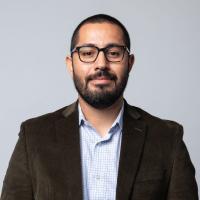
Ulices Piña, Ph.D.
Assistant Professor
Faculty Coordinator for Credit for Prior Learning
Dr. Piña is a native of Long Beach and a product of the California public school system with deep familial roots in the Mexican state of Jalisco. Piña attended Long Beach Polytechnic High School and received his B.A. in History & Spanish and M.A. in History from UC Riverside, and Ph.D. in History from UC San Diego. His teaching and research interests include Mexico, Modern Latin America, revolutions, social movements, democracy studies, political culture, and social activism. Currently, he is completing the final revisions for his book, Rebellious Citizens: Social Upheaval and Democracy in Revolutionary Mexico, which is under contract at the University of Nebraska Press for the Confluencias series on Mexican History. His publications have appeared in the Journal of Social History, Letras Históricas, Latin American Research Review, Oxford Research Encyclopedia of Latin America. His bylines have appeared in The Washington Post and in La Nación (Argentina). Dr. Piña’s research has been supported by the Institute for Citizens & Scholars, the Fulbright Commission in Mexico (COMEXUS), the University of California Institute for Mexico and the United States (UC-MEXUS), and the National Institute of Historical Studies on the Revolutions of Mexico (INEHRM), among others. He is also a long-time supporter of the Los Angeles Galaxy.
Courses HIST 301: Methodology of History; HIST 364: Latin American Nations; HIST 457: Cycles of Violence in Mexico; HIST 462: Mexico; HIST 476: The History of Social Activism; HIST 499: Senior Seminar (Revolutionary and Social Movements in Latin America); HIST 502: Historical Research and Writing.
Location: FO2-112
Email: ulices.pina@csulb.edu
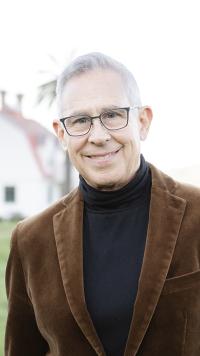
Charles L. Ponce de Leon, Ph.D.
Professor
Charles Ponce de Leon, Professor of History and American Studies, is a specialist in US cultural and intellectual history. He received his BA from UC Santa Barbara and a PhD from Rutgers University, and his fields of expertise include mass media and the commercial culture industries, American intellectual life, and modern U.S. political culture. His research has focused on the history of American journalism and the mass media, particularly the connections between political culture and the commercial culture industries. He has written four books: Self-Exposure (University of North Carolina Press, 2001), a monograph examining the origins and cultural significance of human-interest journalism about celebrities in the early 1900s; Fortunate Son (Hill and Wang, 2006), a biography of Elvis Presley; That’s the Way It Is (University of Chicago Press, 2015), a history of television news in the US; and, most recently, All the News That Fits: Rolling Stone Magazine and the Rise of Hip Capitalism (University of North Carolina Press, 2025). He has previously taught at Princeton University and Purchase College (SUNY) and has been at Long Beach State since 2008.
Courses HIST 173: Recent United States History; HIST 379: The Twenties, Depression, and World War II; HIST 380A: The United States in the Liberal Era, 1945-1968; HIST 380B: The United States, 1968-2008; HIST 477B: American Cultural History since 1877; HIST 499: Senior Seminar (Topics in US Cultural and Intellectual History)
Location: FO2-214
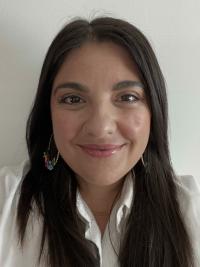
Carie Rael, Ph.D.
Assistant Professor
Carie Rael received her B.A. in History and Comparative Religion, and M.A. in History from California State University, Fullerton, and Ph.D. in History from Rutgers University. Her research focuses on im/migration and the borderlands, labor, urban politics, Latinx history, and the carceral state. She co-authored three chapters entitled, “Black and Puerto Rican Student Experiences and Their Movements at Douglass College, 1945-1974,” “We the People’: Student Activism at Rutgers and Livingston College, 1960-1985,” and “Twenty-Twenty Vision: New Jersey and Rutgers on the Eve of Change” in Scarlet and Black Volume III: Making Black Lives Matter, 1945-2020.
Courses HIST 173: Recent US History; HIST 301: Methodology of History; HIST 499: Senior Seminar (US carceral systems and the Rebel Archive); HIST 380B: The United States Since 1968; CHLS 300: Chicano History
Location: FO2-118
Email: carie.rael@csulb.edu
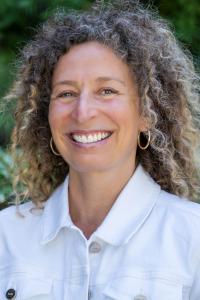
Sarah Schrank, Ph.D.
Professor
Sarah Schrank received her doctorate in U.S. History from the University of California, San Diego, where she completed a thesis on the politics of modern art in Los Angeles. Her research and teaching specialties include urban culture, California, public art, gender and the body, and countercultural capitalism. She has published three books including Art and the City: Civic Imagination and Cultural Authority (University of Pennsylvania Press, 2009); Free and Natural: Nudity and the American Cult of the Body (University of Pennsylvania Press, 2019); and Healing Spaces, Modern Architecture, and the Body (co-edited with Didem Ekici; Routledge, 2017). She has published articles on a wide range of topics including the Watts Towers, bohemian art communities, suburban architecture, early twentieth-century body culture, and yoga. Most recently, she published "American Fitness: Gender, Wellness, and the New Body Politic,” Reviews in American History 51:2 (2023) and “The Trouble with Wellness,” Race and Yoga 8:1 (2024). Professor Schrank has been awarded research fellowships by The Huntington, the Haynes Foundation, The Wolfsonian-FIU, and the Davis Center for Historical Studies at Princeton University and was honored to receive the CSULB Outstanding Professor Award (2022) and the President’s Award for Outstanding Faculty Achievement (2018).
Courses HIST 173: Recent US History; HIST 473: California History; HIST 595: Directed Study; HIST 698: Thesis Writing
Location: FO2-204
Email: sarah.schrank@csulb.edu
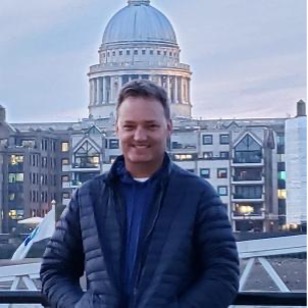
David Sheridan, Ph.D.
Lecturer
David Sheridan has taught in the History Department at California State University, Long Beach since the Fall of 2006. His historical interests and training center around modern European history, with a focus on gender, music, culture, and social history. Dr. Sheridan’s research on the relationship between musical work, gender, and wartime identity during the Second World War in Britain formed the crux of his doctoral project titled “‘Give us More Music’: Women, Work, and Musical Culture in Wartime Britain, 1939-1945.” His chapter “‘Singing While England is Burning’: Women as Working ‘Music Travellers’ in Wartime Britain,” in Women and Work Culture in Britain, 1850-1950, eds. Krista Cowman and Louise Jackson, Ashgate, 2006, is related to his doctoral research. Additionally, he serves as CSULB’s Coordinator of Program Review and Assessment in Academic Affairs, through the Office of Program and Institutional Effectiveness (OPIE). His outside interests include the filmography of Terrence Malick and Krzysztof Kieślowski, Gulf Coast seafood, college football, and the music of Howard Hanson and Herbert Howells.In addition to his work on campus, he performs as a professional musician, both as a choral singer and conductor, within the Southern California choral music scene.
Courses HIST 330: Early Modern Europe; HIST 331: History of Modern Europe; HIST 357: Recent Britain; HIST 303: Rebels and Renegades; HIST 302: Theory and History; HIST 499: Senior Seminar
Location: FO2-208
Email: david.sheridan@csulb.edu
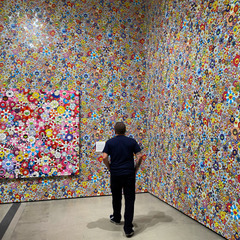
Sean Smith
Lecturer
Director, Center for the History of Video Games, Technology and Critical Play
Sean Smith has lectured in the History Department since 2001. His research explores the connections between popular culture, leisure, and gender, particularly within California and the American West. His early work examined gender identity and its portrayal in media and leisure spaces and informs his current scholarship that focuses on video games and their history. His recent publication, “Pinball Wizards and Losers: Race, Criminality, and Pinball in Los Angeles 1978-1983,” in Interdisciplinary Digital Engagement in Arts & Humanities (IDEAH), is part of a broader project analyzing the relationship between video game culture, race, class, and the geography of Los Angeles County arcades during the 1970s and 80s. He also investigates digital humanities and pedagogy, exploring how writing about video games enhances historical learning. His publications with Jeffrey Lawler include “Reprogramming the History of Video Games: A Historian’s Approach to Video Games and their History” (International Public History) and “Imagining the Other: Historical Possibilities and Teaching with Twine” (En Twine: A Critical and Creative Companion to Teaching with Twine)
He also co-directs the CSULB Center for the History of Video Games, Technology and Critical Play, a gaming archive and research center dedicated to video games and digital gaming technology.
Courses HIST 473: California History; HIST 306: Video Games, Representations, and Historical Memory; HIST 172 - Early United States Survey; UHP 401: History and Culture of Los Angeles; HIST 305: Digital Methods in Historical Research; HIST 307: A Critical History of Computing and Video Game Technology; HIST 474: History and Culture of American Cities
Location: FO2-212
Email: sean.smith@csulb.edu
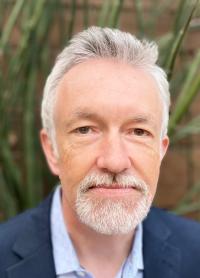
Hugh Wilford, Ph.D.
Professor
Hugh Wilford joined the History Department in 2006, having taught previously at the University of Sheffield in the United Kingdom. Trained in the U.K. as a U.S. intellectual historian, he has published widely on such topics as the New York Intellectuals, Americanization and anti-Americanism, and the history of the CIA. Dr. Wilford is the author or co-editor of six books, including The CIA: An Imperial History (New York: Basic Books, 2024); America’s Great Game: The CIA’s Secret Arabists and the Shaping of the Modern Middle East (New York: Basic Books, 2013); and The Mighty Wurlitzer: How the CIA Played America (Cambridge, MA: Harvard University Press, 2008). He also wrote and presented the Great Courses lecture series on the history of the CIA, The Agency (2019). He has received awards and fellowships from, among other grantors, the U.K. government, the Fulbright Commission, the Gilder Lehrman Institute, and the National Endowment for the Humanities.
Courses HIST 173: Recent United States History; HIST 301: Methodology of History; HIST 451: The United States in the World; HIST 499: Senior Seminar; HIST 673: Seminar in U.S. History.
Location: FO2-216
Email: hugh.wilford@csulb.edu
Part-Time Faculty
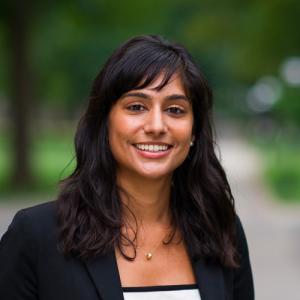
Nimisha Barton, Ph.D.
Lecturer
Nimisha Barton is a Lecturer who specializes in modern European history. Her first book, Reproductive Citizens: Gender, Immigration, and the State in France, 1880-1945, appeared in 2020 with Cornell University Press. Reproductive Citizens received the American Historical Association’s J. Russell Major prize for best Anglophone book in French history as well as Honorable Mention for the Society of French Historical Studies’ David H. Pinkney Prize for the most distinguished book in French history and Honorable Mention for NYU’s Lawrence Wylie Prize for best cultural history in French studies. Her most recent book, entitled A Just Future: Getting From Diversity and Inclusion to Equity and Justice in Higher Education explores the early radical potential of diversity, equity, and inclusion programs in educational institutions and encourages educators to once again pursue educational freedom through anti-oppressive praxis. Currently, Dr. Barton is at work on her third book, A Family of Mystics: Myth-Making and Memory Healing in the Sephardic World, an exploration of the inner world of self-described “Oriental mystic” Lounah Starr who, through her self-fashioning, storytelling, and artwork, transformed her family’s centuries-long saga of exile and persecution into a narrative of spiritual redemption and healing.
Courses HIST 336: French Revolution and Napoleon; HIST 302: History Theory and Methods; HIST 112: World History Since 1500; HIST 335: Old Regime France; HIST 435: The Francophone World
Location: FO2-206
Email: nimisha.barton@csulb.edu
Gregory Beirich, Ph.D.
Lecturer
Dr. Beirich holds a Ph.D. in Medieval Religious and Intellectual History from Fordham University. His research interests involve the development and application of medieval intellectual concepts of political, religious, and social outsiders. In particular, Dr. Beirich finds the challenges that medieval heresy presented to social and political authority fascinating, and he seeks to situate these challenges within the overall context of medieval society and culture while at the same time relating them to more contemporary developments. In other words, he explores what the dissenters of the past can tell us about the dissenters of our own times. Dr. Beirich has taught a variety of courses in the History Department at California State University, Long Beach, including Critical Thinking, Ancient, Medieval, and Modern Western and World History, the Middle Ages, Research Methods, Historiography, The Italian Renaissance, The Reformation, the Development of Modern Europe, Modern Europe, and Medieval Heresy and Witchcraft. He also has a keen interest in collegiate and professional football that stems from his days as an undergraduate at the University of Texas, Austin.
Location: FO2-118
Email: gregory.beirich@csulb.edu
Neal Cates
Lecturer
Neal Cates has taught in Long Beach Unified School District (LBUSD) since September 2002. He taught Ancient World History, AVID, and coached soccer at Hoover Middle School for 13 years. While teaching middle school students about the ancient world, Neal earned an MA in World and European History in the Spring of 2010. Beginning in the Spring of 2015, Neal has taught one section of History 401 – History for History Teachers. This class allows Neal to share his vast experiences teaching in Middle and High School, where he’s taught since the 2016-2017 academic year. At McBride High School, Neal has taught AP World History as well as other H/SS classes. Neal is excited each semester to help future history teachers learn the content necessary to be a competent teacher as well as emphasizing pedagogical strategies to create a successful learning environment at CSULB and the H/SS Credential Program.
Courses HIST 401: History for Secondary Social Science Teachers
Location: FO2-116
Email: Neal.Cates@csulb.edu
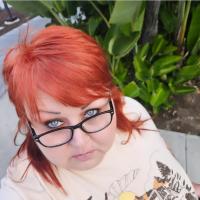
Julie Haltom
Lecturer
Coordinator, History Writing Tutors
Julie Haltom is a Lecturer who specializes in the American West, frontier expansion, homesteading, and nineteenth- and twentieth-century California. Her first article, “Reinventing the Frontier: Jackrabbit Homesteading as New Pioneers,” is currently under review with Southern California Quarterly. It examines small tract homesteading in the Mojave Desert as a process of frontier reinvention that allowed postwar Southern Californians to recapture the cultural memories of the past. A précis of her graduate research, titled “Jackrabbiting Away from Urban Spaces,” was featured in The Metropole, a blog published by the Urban History Association. Professor Haltom teaches U.S. History surveys and a lower division critical thinking course. She also teaches an upper division course on California History. Currently, she serves as the faculty coordinator for the History Writing Tutors.
Courses HIST 101: Facts, Evidence and Explanation; HIST 172: Early U.S. History; HIST 173: Recent U.S. History; HIST 473: California History
Location: FO2-107
Email: Julie.Haltom@csulb.edu
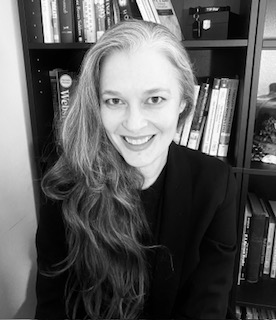
Holly Hernandez
Lecturer
Holly Hernandez is an alumna of California State University, Long Beach. Her interests include Women’s History as well as regional and local history, and her work on Long Beach’s historic Rancho Los Alamitos has become a valuable source for researchers of the American west. She has worked as a lecturer in the department of history for nearly a decade and has created supplementary materials for several American and World History textbooks.
Course HIST 101: Facts, Evidence, and Explanation; HIST 172: Early US History; HIST 173: Recent US History; HIST 473: California History; HIST 485A: History of Women, US Early Period; HIST 485B: History of Women, US Recent
Email: Holly.Hernandez@csulb.edu
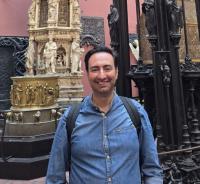
Reza Yeganehshakib, Ph.D.
Lecturer
Dr. Reza Yeganehshakib holds a Ph.D. in History from the University of California, Irvine. He also earned an M.S. in Environmental Studies from California State University, Fullerton, and a B.S. in Chemical Engineering. He has written extensively on political risk, economic history, and energy policy, with his work appearing in various international publications. He has also contributed to global media discussions, offering insights on geopolitics, sustainability, and economic development.
He has published two monographs: Baku-Tbilisi-Kars Railroad: Creating a New Era through the Revival of the Silk Roads (2022) [ISBN: 9789645263353], which analyzes the geopolitical and economic significance of modern infrastructure in the context of historical trade routes, and Iran-India Energy Cooperation: Drawing a Bigger Image of the Two Nations’ Relations (2022) [ISBN: 9789645263469], which examines the evolving energy partnership between Iran and India as a foundation for broader bilateral cooperation across multiple sectors.
In addition to his academic career, he is providing consulting services to the private sector in the fields of energy and environmental policy. His interdisciplinary research spans public and environmental history, energy politics, economic development, and global sustainability. To stay updated on his latest research, publications, and insights, follow him on Instagram, LinkedIn, and X.
Courses HIST 111: World History, Origins to 1500; HIST 173: Recent United States History; HIST 132: Modern Western Civilization; HIST 172: Early United States History
Location: FO2-110
Email: Reza.Yeganehshakib@csulb.edu
Staff
Phyllis Simon
Administrative Support Coordinator II
Location: FO2-106
Email: phyllis.simon@csulb.edu
Phone: (562) 985-4432
Marcy Bacani
Department Coordinator
Location: FO2-104
Email: marcy.bacani@csulb.edu
Phone: (562) 985-7274





